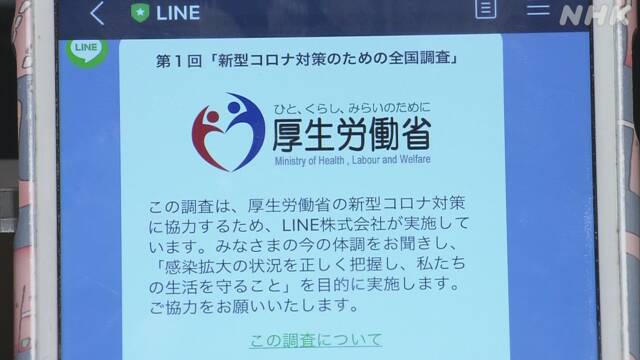Approximately 27,000 people nationwide “Fever continues” Ministry of Health, Labor and Welfare and LINE survey April 10, 21:25
In a nationwide survey conducted by the Ministry of Health, Labor and Welfare and LINE, a major telecommunications app, to combat new coronaviruses, 0.12% of all people answered that fever has continued for more than four days, or about 27,000 people nationwide. I knew I was going up. In particular, the number of people who had been working long hours or working outside the office was twice as likely to complain of fever. Experts say that it is necessary to be more thorough in working and spending time to reduce the risk of infection.
In this survey, LINE signed an agreement with the Ministry of Health, Labor and Welfare to provide information, and asked more than 80 million users nationwide about their health status and measures to prevent infection. Surveys were conducted.
An analysis of approximately 24 million nationwide responses received so far revealed that the percentage of those who answered that fever of 37 ° C for 5 minutes or more lasted for 4 days or more was 0.11% on a national average, or 2 in number. More than 6,900 people climbed.
By prefecture, Okinawa was the highest, followed by Tokyo, Hokkaido, and Osaka, which exceeded the national average.
Classification of people complaining of fever by occupational group shows that in groups of occupations where it is difficult to avoid prolonged contact or crowding, such as restaurants and outside sales, it is 0.23%, an average of 2%. Was climbing more than twice.
On the other hand, in the group where it is relatively easy to avoid contact with people, such as those who do housework and childcare at home, the ratio was 0.05%, less than half of the average for the whole.
"Fever for more than four days does not immediately indicate a new type of coronavirus infection, but it is difficult to keep a distance from humans," said Prof. Hiroaki Miyata of Keio University who analyzed the data in cooperation with the Cluster Task Force of the Ministry of Health, Labor and Welfare. People who work and spend less time with defensive behavior are likely to be at higher risk of infection, especially in those occupations where the risk of infection is reduced, such as by creating an environment that allows them to keep a distance from them. We need to be more thorough about working and spending less. "

